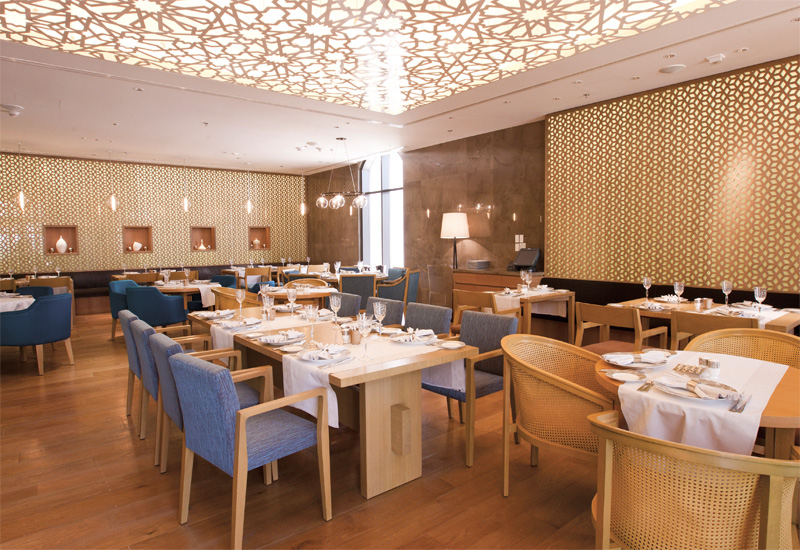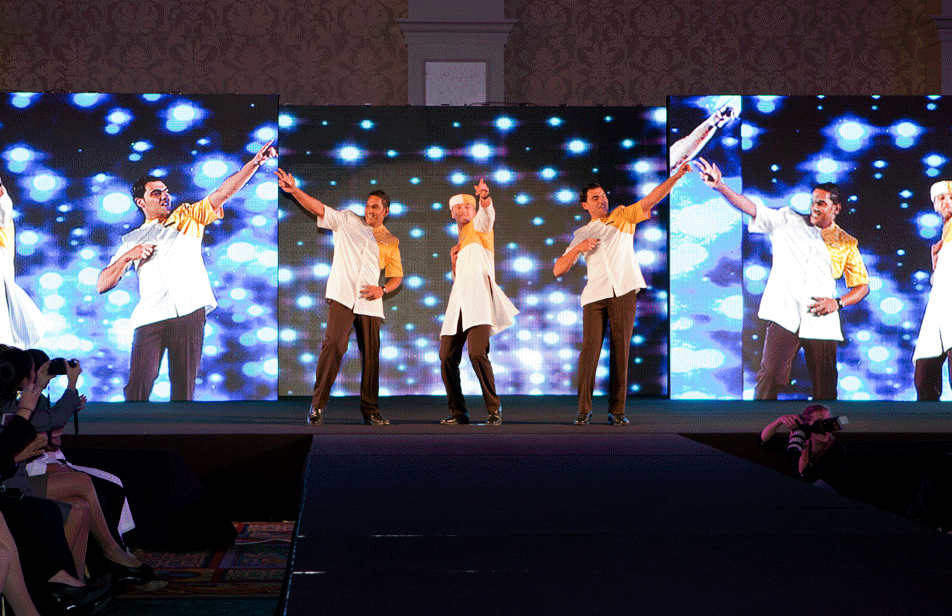More than just food
Gache explains that with each restaurant, the F&B team has tried to offer something different, and in addition to the food, to interact with the guests. For example, Gache details how the Chinese restaurant Li Jiang has a DJ every night to provide a lounge-like atmosphere in the evenings, along with a chef who prepares hand-pulled noodles in front of the guests.
In the steakhouse, The Forge, the kitchen is placed at the centre of the 90-seat restaurant, where diners can view the chefs grilling and preparing meals. The Lebanese restaurant Mijana boasts a frosted glass behind which the chef’s silhouette can be seen as he goes about baking bread.
He adds: “In addition to that each restaurant has a beautiful bar; we are trying to create a life through their bar to make people arrive a little bit early and interact in a lounge-like atmosphere. After that they can dine, and then maybe later, come back to the bar and continue with their evening.”

| Advertisement |
Design it right
The three signature restaurants at the Ritz-Carlton Abu Dhabi — Li Jiang, The Forge, and Mijana — were designed by Japanese design firm, Super Potato, which provided an extremely detailed design document to the team.
Gache reveals that the firm was also instrumental in helping him and Siddiquie pick out FoH themes. Super Potato’s designers guided the hotel on how to pick items that matched their original design vision.
The designs in the venues are consequently reflected in the front of house — in Mijana for example, the Arabesque patterns on the ceiling and frosted glass dividers are seen in the linen, the glassware, and right down to the receipt container. In The Forge, the theme was “iron, glass and light” which shows itself through the interiors to the cutlery and glassware.
Gache adds: “It was quite a big help for us to make sure that we nailed down everything really well. The concept always needs to be very strong, and any restaurant with a good concept is successful.”
Authenticity is key
Gache has travelled around the world for more than two decades and he credits his experiences with influencing his work. He smiles and says: “I started my career with expatriation when I was 19, and I’m 41 today. It’s been over 20 years.
“I compare myself to a doctor. Do you know how? There are two types of doctors — specialists and generalists. I’m a generalist, not a specialist. I know a little bit of everything because going around the world with my career has given me some extra perspectives and approaches, that if I had stayed 20 years in Europe, I would not have.”
These wide-ranging experiences have lended to his style of working, and he says being authentic with the food is something he enforces in all restaurants under his wing.
“Yes, the food here is authentic. We have to be. Authenticity right now is the key of having successful outlets. All those fusion restaurants from 10 years ago don’t fit anymore. People really want to go back to authenticity, with the right products and a simple way of cooking,” he concludes.
Chef profile
A French national with extensive experience in European, Asian and Middle Eastern cuisines, David Gache started his career with the InterContinental Hotels Group in Geneva and London, where he honed his culinary skills at Michelin-star restaurants.Having spent more than five years in Europe, Gache joined Le Méridien resort in Vanuatu in the South Pacific Ocean as sous chef and throughout the years worked at the company’s properties in Bahrain, Indonesia and Thailand. Prior to this appointment, Gache served as executive chef of the 245-key Ritz-Carlton in Bahrain, a luxury resort on Manama Bay that he joined in September 2008. Gache enjoys scuba diving, rugby and spending time with his two children.










 Search our database of more than 2,700 industry companies
Search our database of more than 2,700 industry companies









